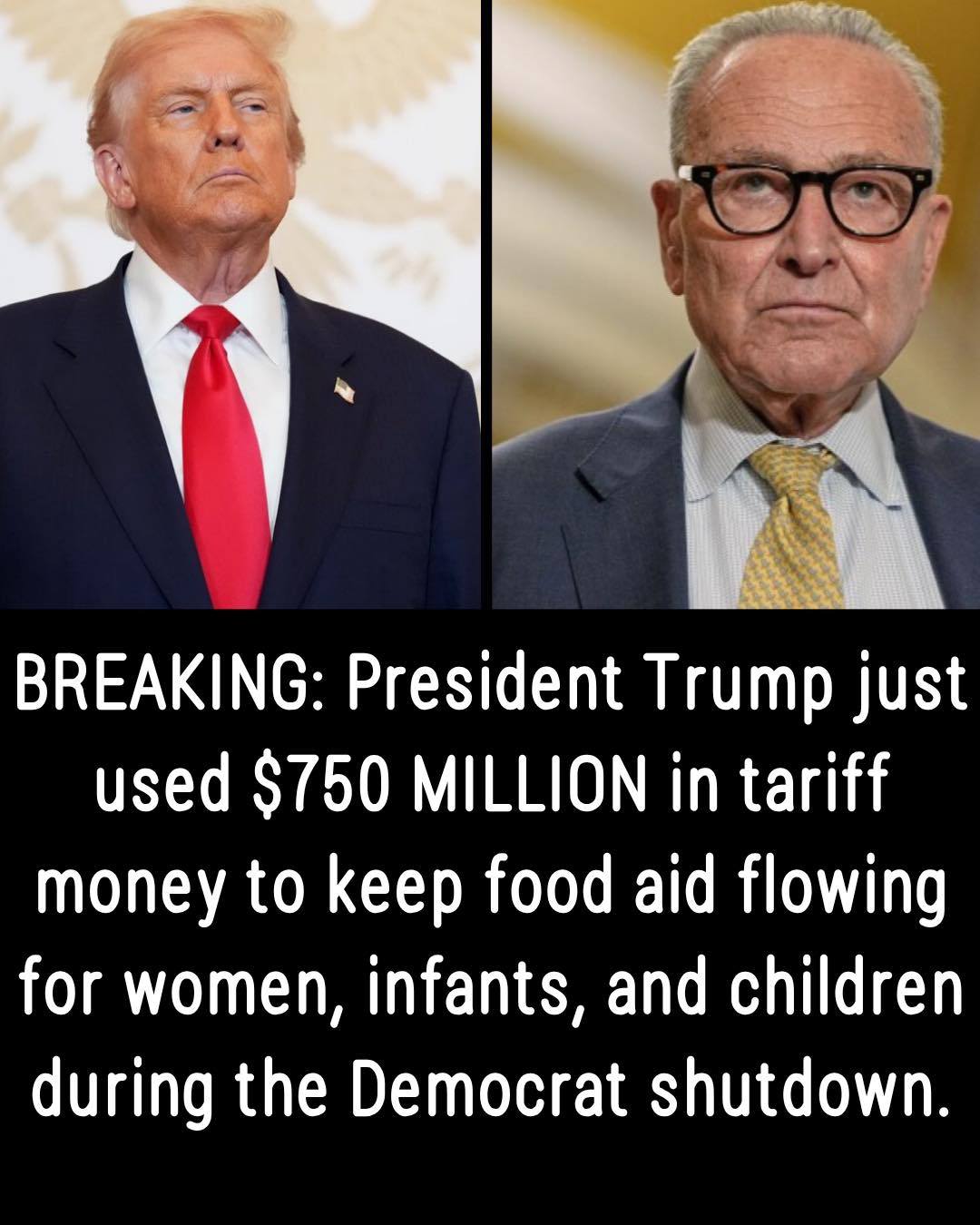The Politics of Shutdowns: How Trump’s Tariff Revenue is Keeping Food Assistance Alive
The recent government shutdown has escalated political tensions in Washington, leaving millions of Americans uncertain about their future. One of the most significant casualties of the shutdown has been vital government programs, especially those that provide food assistance for women, infants, and children (WIC). During such turbulent times, essential government services come to a halt, leaving many vulnerable citizens scrambling to meet their basic needs. However, in a move that caught many off guard, President Donald Trump utilized $750 million from tariff revenue to keep the food assistance programs running. This action has sparked a heated debate about the role of tariffs, the effects of the shutdown, and the government’s ability to effectively address the needs of its citizens.
The Impact of the Shutdown on Government Services:
A government shutdown is never a simple matter—it affects people’s lives in ways that are often overlooked. The impact is most acutely felt by those who rely on social safety nets such as food assistance, housing programs, and healthcare benefits. When the government shuts down, programs like WIC, which helps provide food to low-income women, infants, and children, are put on hold, jeopardizing the health and well-being of vulnerable families.
During a time when the nation is divided over political issues, the shutdown amplifies the suffering of those who are already struggling to make ends meet. A lack of food aid can lead to malnutrition, developmental delays in children, and increased healthcare costs for families who may not be able to afford private care. These consequences serve as a reminder of the far-reaching effects of government inaction on the daily lives of its citizens

Trump’s Unconventional Move:
In an unexpected and controversial move, President Trump authorized the use of $750 million in tariff revenue to continue funding food assistance programs for women, infants, and children. This decision has raised eyebrows across the political spectrum, with some praising the president for taking swift action to prevent hardship, while others argue that it’s an unfortunate reliance on a temporary solution to a long-term problem.
The funds from these tariffs are being used to maintain crucial services, providing some semblance of stability to those who depend on government support. However, it raises important questions about the sustainability of this approach and whether it is truly a viable solution for the future.
The Role of Tariffs in Government Funding:
Tariffs, or taxes imposed on imported goods, have been a contentious issue in the U.S. for many years. Under President Trump’s administration, tariffs on Chinese imports were implemented as part of the broader trade war between the two countries. These tariffs, which were originally positioned as a tool for protecting American jobs and industries, have had a mixed reception in terms of their effectiveness.
Critics of the tariffs argued that they would ultimately hurt American consumers, driving up prices and leading to economic instability. Many Democrats warned that the tariffs could lead to an economic downturn, even a Depression, if they caused prolonged trade conflicts or retaliatory actions from other nations. Yet, in a surprising twist, the same funds that were feared to destabilize the economy are now being used to support domestic programs like food assistance.
This unexpected development highlights the complexities of economic policies and their far-reaching consequences. The tariff revenue, which was intended to put pressure on China, is now being repurposed to help the most vulnerable members of society. For many, this turn of events is a stark reminder of the unintended consequences of political and economic decisions.

The Response from Democrats:
The use of tariff funds to maintain food assistance during the shutdown has created a divide among political parties. For many Democrats, the idea of relying on tariff revenue to fund essential programs is an uncomfortable paradox. These same tariffs were once a central point of contention, with Democrats accusing President Trump of threatening the economic stability of the nation.
Yet now, these very funds are keeping crucial programs running, which has forced some Democrats to reconsider their stance. In some ways, this move has turned the tables on the opposition, highlighting the complexities of the political landscape. The very tariffs they warned against have now become an unexpected lifeline.
This paradox has led to a range of reactions from both sides of the political spectrum. Some Democrats have acknowledged the necessity of using the tariff revenue to protect the most vulnerable, even if it means accepting a policy they have long opposed. Others remain critical, questioning why the government is not doing more to find a permanent solution to the shutdown rather than relying on temporary measures.
A Temporary Fix or a Long-Term Solution?
While using tariff revenue to keep food assistance running is undoubtedly a relief to those who need it most, it raises critical questions about the long-term sustainability of this solution. Is it enough to rely on tariffs for funding, or does the government need a more comprehensive, long-term plan to ensure that essential services are always available?
The temporary nature of the current fix is troubling for many who argue that this stopgap measure is insufficient. A permanent solution would require both parties to work together to open the government and secure long-term funding for programs like WIC. The dependence on tariffs, while helpful in the short term, underscores the need for a more stable and predictable funding source for essential services.
Moreover, the fact that these funds are being used to address the immediate needs of the most vulnerable citizens highlights the systemic issue at play. When the government cannot find a way to pass a budget or avoid shutdowns, it leaves citizens in a state of uncertainty and fear. Temporary solutions, like the use of tariff revenue, may prevent disaster in the short run, but they are not sustainable in the long term.

The Political Ramifications:
The ongoing government shutdown has far-reaching political ramifications that extend beyond the immediate consequences of halted government services. President Trump’s decision to use tariff revenue to fund food assistance programs has already sparked intense debate across party lines. For many, this move represents a pragmatic response to the crisis, one that prioritizes the needs of vulnerable Americans over political gamesmanship.
For others, it highlights the failure of the political system to address the underlying issues at the heart of the shutdown. The fact that such a temporary solution was even necessary speaks to the dysfunction in Washington, where partisan gridlock prevents meaningful progress on the nation’s most pressing issues.
In the coming weeks, the question remains: will the government be able to resolve the shutdown and pass a permanent budget, or will reliance on temporary measures like tariff revenue become a regular fixture of American governance?
As the government shutdown drags on, President Trump’s use of tariff revenue to fund food assistance programs has brought to light the complexities of the U.S. political system. While this move has helped avert immediate disaster for vulnerable families, it is not a permanent fix. The reliance on tariffs to fund essential services only underscores the urgent need for both parties to work together and pass a permanent budget that ensures Americans will not have to depend on temporary solutions.
The shutdown has revealed deep divides in American politics, but it has also shown that there is room for compromise, even when it comes to contentious issues like tariffs. The coming days will determine whether President Trump’s backup plan holds or if Congress can reach a more permanent solution.

.


